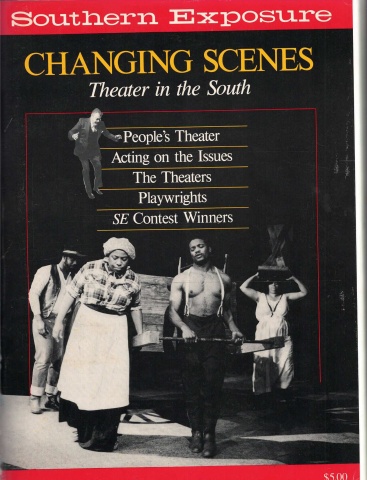The Last Song of John Proffit: Excerpts from a Solo Show by Tommy Thompson

This article originally appeared in Southern Exposure Vol. 14 No. 3/4, "Changing Scenes: Theater in the South." Find more from that issue here.
Here, more or less, is how The Last Song of John Proffit came about:
In the 1840s, when Daniel Decatur Emmitt first paired the banjo with the fiddle on a New York stage, he assisted in the birth of a new form of native American music. He simultaneously helped to initiate the commercial exploitation of black music.
Emmitt was a white man from Ohio, a singer, dancer, fiddler, and the founder of the first blackface minstrel troupe. He wrote hundreds of songs, including “Dixie,” and was, for a long time, America’s most popular entertainer.
A few years ago, fellow writer/musician Bland Simpson and I were considering writing a play, in the form of a minstrel show, using music and comedy to tell a story about Emmitt’s life and times. Alas, the idea had obvious problems. How do you deal with the blackface? How do you make entertainment out of the premier exploiter of black culture?
We needed a foil — someone who knew him, worked with him, but had a better understanding of what was happening. I began to cogitate on this other character, what his story might be, his attitudes, and to whom he might talk. He could be an old guy, I thought, sitting around with his musical cronies from the old days, playing tunes and gabbing about Emmitt. Or he could be alone, talking with visitors who’ve come to ask about his famous friend. He could have been a banjo player who worked with Emmitt and quit before he got famous. Finally, I thought maybe I could play the part, and, in a way, say thanks to the old-timers who have shared their lives and music with me over the last 20 years.
As the foil for our fascinating if dubious hero, I swiped the main character from a novel I was planning, introduced him to Emmitt, and let him talk. By the time John Proffit was done, he’d become a rather longwinded banjo player, and I had a one-man show.
This scene begins in North Carolina in 1900 as an 85-year-old Proffit admits visitors (the audience) into his small kitchen. They are “amateur thespians” who, preceded by a letter of inquiry , have come to ask Proffit about Emmitt’s life. Proffit is drinking whiskey and cutting vegetables to make a pot of soup. Occasionally he picks up his banjo and sings.
Tags
Tommy Thompson
Tommy Thompson is a Chapel Hill-based writer, actor, and musician who plays banjo with the Red Clay Ramblers. Thompson and the Ramblers performed in the world premiere of Sam Shepard’s drama A Lie of the Mind at the Promenade Theater in New York City from December 1985 through June 1986.